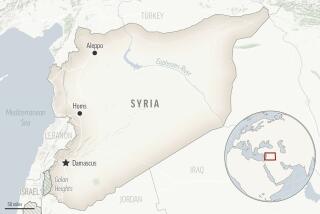Defiant Syrians hold huge protests
Syrian protesters answered President Bashar Assad’s bid to crush a popular uprising by military force with defiance Friday, braving gunfire and tanks to turn out by the tens of thousands around the capital and across the country.
It was the first major day of demonstrations since an offensive in the city of Hama began six days earlier. They signaled the failure so far of Assad’s use of the military to try to regain full control of his country.
At least 24 people were killed, 13 of them in Damascus, the capital, and its outskirts, according to the Local Coordination Committee in Syria, a coalition of opposition groups.
Security forces deployed at mosque doors, in the streets and on rooftops countrywide, trying to stave off the expected swell of protests on the first Friday of the holy month of Ramadan.
Assad, whose family of minority Alawites, a small Shiite sect, has ruled for more than 40 years, launched a military offensive Sunday in Hama that is reported to have killed at least 200 people. The move was seen as an effort to block the country’s popular uprising from surging out of control during Ramadan.
Despite the crackdown, Friday’s crowds were “more than usual,” said Rami Nakhle, a spokesman in neighboring Lebanon for Syria’s opposition coalition.
“Because of the crackdown in Hama, people all over went out on the streets in solidarity,” Nakhle said. “This is what happens when the government tries to stop us.”
The refusal of the civilian opposition to be intimidated shows that Syria’s crisis is “clearly well out of hand” for Assad, Andrew Tabler, a Syria expert at the Washington Institute for Near East Policy, said by telephone.
It also demonstrates “that much as the political solution is not working, also the military solution is not working,” Tabler said.
A lawyer in Damascus had a harsher judgment. “Syria at this moment may be considered a failed state, and its people are under arrest,” said the man, who identified himself only as Abdullah.
Videos posted online showed armed security forces scurrying through the streets of the restive Damascus suburb of Moadamyeh and protesters scrambling for cover as gunfire crackled in the Arbaeen district just outside the center of the capital.
Demonstrators in the Midan neighborhood of Damascus poured out of one mosque after Friday prayers chanting a call for the fall of the regime. A Times special correspondent saw protesters hurling rocks as they battled security forces firing tear gas at them. The 30-minute clash ended with the soldiers retreating.
Troops fired live rounds at another protest in Midan, Khaled, a 29-year-old protester, told The Times.
The escalating rallies will probably put a strain on Assad’s security troops, and perhaps exhaust them. In Damascus, protesters have begun gathering at odd hours around the clock, one opposition supporter said.
“We know what to do to support Hama, so every day we go out in demonstrations after the evening prayers, and in many cases we go out after the dawn prayer,” said the protester, Mohammed, 23.
The protests threaten the relative calm in the capital that has helped Assad hold on. Rallies also were held Friday in Aleppo, which is one of the country’s commercial centers, and in the central city of Homs, Dara in the south and Qamishli in the north, according to activists. Several thousand people protested in Dair Alzour in defiance of security forces surrounding that eastern city.
In Hama, security cordons and at least one new round of shelling prevented residents from gathering for Friday prayers.
State TV showed scenes of blasted buildings and flattened barricades on deserted streets, suggesting much of the city was back under government control.
Opposition accounts quoted one of several thousand people reported to have fled Hama as saying that Syrian forces were compelling Hama’s civilians to clear bodies from the streets, and that he alone had carried away 27.
The brutality of the assault on Hama triggered rare public criticism from a fellow Arab government on Friday.
Kuwait’s foreign ministry expressed “extreme pain” over the violence in Syria and called for a political dialogue to bring “true reforms that meet the legitimate demands of the Syrian people, away from the security actions,” according to a statement carried by the Kuwait state news agency.
In Damascus, several Syrians said they wondered what it would take to move the world to intervene.
“There are crimes against humanity currently being committed in Hama, and Arab and foreign countries are still watching and awaiting what might happen next,” said one 34-year-old resident, who identified himself by his first name, Jaafar.
Knickmeyer is a special correspondent.
Times staff writer Borzou Daragahi, special correspondent Alexandra Sandels and a special correspondent in Damascus contributed to this report.
More to Read
Start your day right
Sign up for Essential California for news, features and recommendations from the L.A. Times and beyond in your inbox six days a week.
You may occasionally receive promotional content from the Los Angeles Times.






